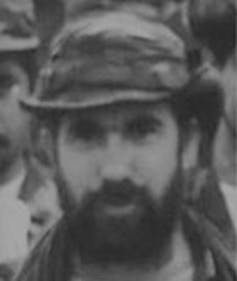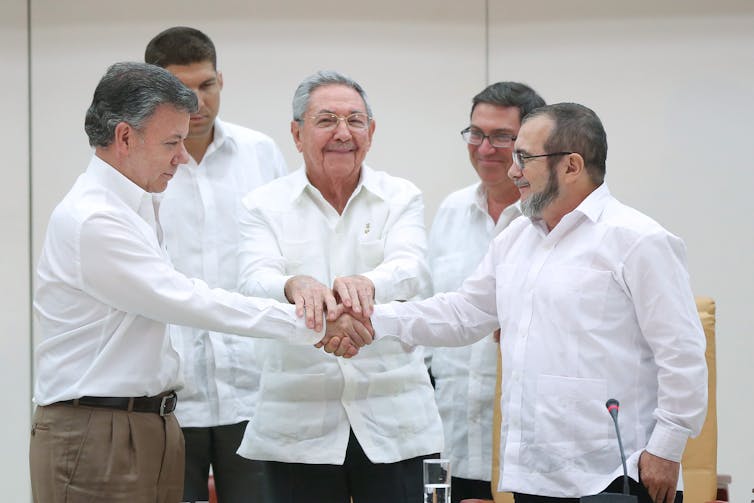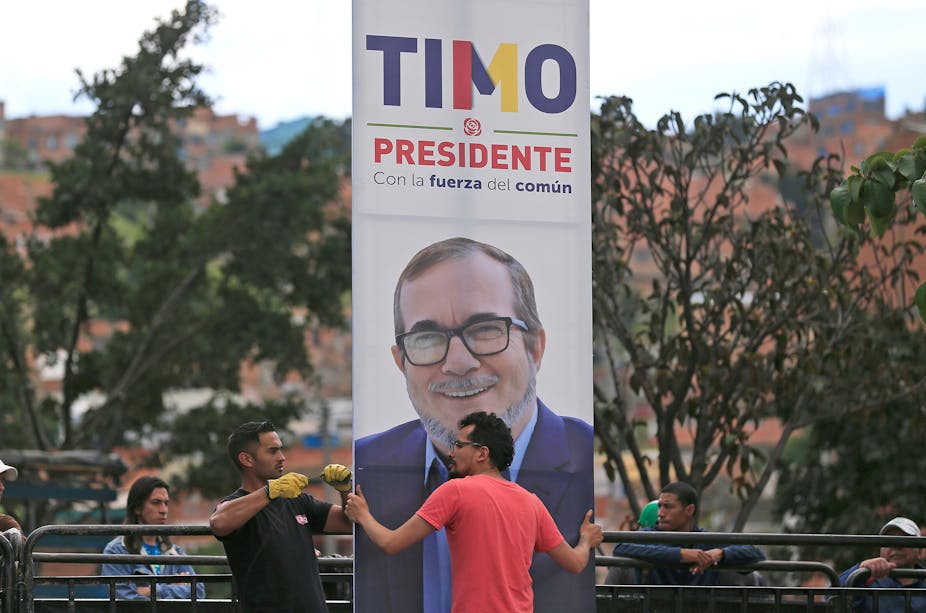In a decision with far-reaching consequences for Colombia’s fragile peace process, the FARC – a political party formed by former Marxist guerrillas from the Revolutionary Armed Forces of Colombia – has withdrawn from the country’s presidential race after candidate Rodrigo Londoño underwent open-heart surgery in Bogota.
The 59-year-old Londoño, who as leader of the violent rebel group used the name Timochenko, had a heart attack in 2015. Last year, not long after signing a historic peace deal with the Colombian government, he suffered a stroke.
Despite concerns that his health problems were a political liability, Londoño’s symbolic power and name recognition won him the nomination to lead the FARC’s ticket. This is the group’s first election since laying down weapons on June 27, 2017.
Londoño, who was polling at zero percent in February, didn’t stand a chance of winning in the May 27 election. But his candidacy was symbolic of the rebel group’s transition from armed struggle to political participation.
Rather than disrupt that process, Londoño’s departure may actually ease the country’s delicate transition away from violence. As a scholar of civil conflict, I believe this ex-guerrilla’s withdrawal from public life could be good news for Colombia.
Colombia’s violent campaign season
The FARC’s entry into politics, a requirement of the 2016 peace deal, has divided this violence-scarred nation. Colombians first rejected the peace deal, narrowly, in an October 2016 referendum, and the final agreement barely made it through to congressional approval.
Today, many people have accepted the FARC’s political participation as a necessary, if odious, condition of peace. But, in my assessment, Timochenko’s candidacy was too much, too soon.
It got underway before people had been able to fully reckon the FARC’s outsize role in their country’s 55-year armed conflict, which has killed 225,000 and displaced millions. Colombia has yet to launch the transitional justice process that will try war criminals and compensate victims. Many Colombians bristled at seeing the FARC’s commander run for president without ever having acknowledged inside a court room the suffering his organization caused.

The country also remains generally uncomfortable with the FARC’s radical left-wing rhetoric. Politicians on the right have inflamed deep-set fears of the Marxist-Leninist guerrilla group, saying that the FARC will turn Colombia into a Communist dystopia. FARC campaign rallies in Cali, Armenia and other cities have experienced boycotts, taunts and violence.
Despite accusations by the FARC that its conservative factions orchestrated the attacks at campaign events, candidates across the political spectrum have seen virulent protest in a Colombian election year marked by violence.
Gustavo Petro, a progressive former Bogota mayor, was attacked in his car after a March campaign rally in the city of Cúcuta. He is currently running in second place in the presidential race. The hard-line former president and current senator, Alvaro Uribe – who backs right-wing frontrunner Ivan Duque – has also been booed at his public appearances.
The FARC’s big fail
The FARC faces deeper challenges this election season, too.
The peace deal guaranteed the group – which, despite its rebranding as a political party, remains on the U.S. terrorist watch list – 10 seats in Congress for a period of two four-year terms.
But FARC candidates performed poorly in Colombia’s March 11 congressional elections. Only 52,532 people voted for the FARC’s congressional candidates – less than 0.4 percent of the nearly 14.5 million votes cast.
The FARC was clearly going to struggle to win Colombians’ support. After half a century of civil conflict, 77 percent of Colombians hold a negative opinion of the group. That’s why the group’s leaders insisted on obtaining a quota of congressional seats in exchange for disarming.
But its bad results in the congressional ballot were worse than expected. The FARC retired 7,000 guerrillas when it demobilized in 2017 and got just 52,000 votes in exchange. It once used those same troops to exert control over some 600 municipalities in Colombia, influencing the lives of many millions of Colombians.
Such power loss is actually typical for armed groups who have laid down their weapons, though. Once guerrillas no longer threaten violence or command resources, many people who once “supported” them drift off. The FARC is now failing to compete with more established left-wing forces, including the Democratic Pole and Progressivists Movement.
As a result, Lodoño’s withdrawal from the presidential race probably won’t much change the election outcome. He had such low popular support that his voters’ transferred allegiances won’t alter the political math in May.
Sustaining a tenuous peace
His exit could, however, endanger the country’s already faltering peace process.
Many former FARC fighters are frustrated by how slow the government has been to implement the agreements it made with the rebel group in 2016. More than 1,000 ex-combatants have already rejoined other armed groups in Colombia.
Londoño was the only presidential candidate who openly defended the controversial peace deal. Without him in the race, its more contested provisions are political orphans.

The perception that the deal is imperiled could spur more former FARC fighters to return to armed struggle, seeing it as the best way to achieve their agenda of agrarian reform and radical social change.
Ultimately, though, I think Lodoño’s health problems may prove a lucky break for Colombia and the FARC. His withdrawal spares the volatile young party the embarrassment of being crushed in next month’s presidential primary and gives the transitional justice system time to do its job before the FARC faces voters again for 2019’s mayoral races.
Lodoño’s campaign was an important step in the FARC’s transition from armed rebellion to political party. But it was a powder keg. His retirement averts the risk of a big explosion.

